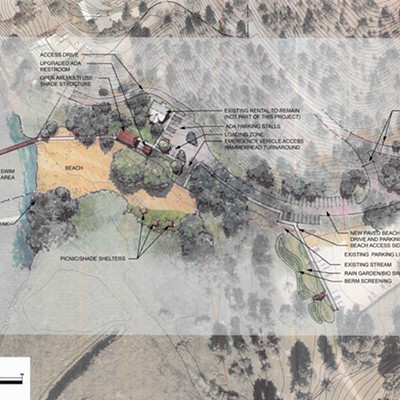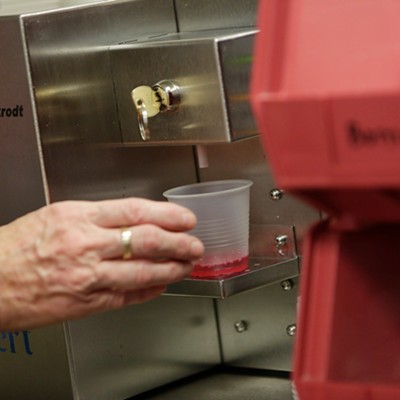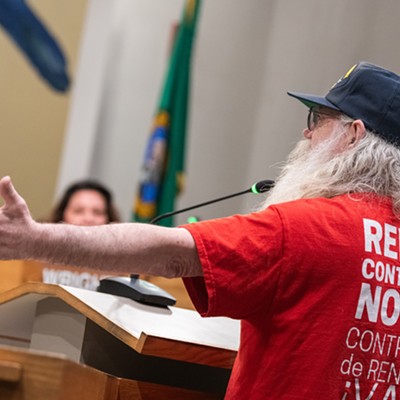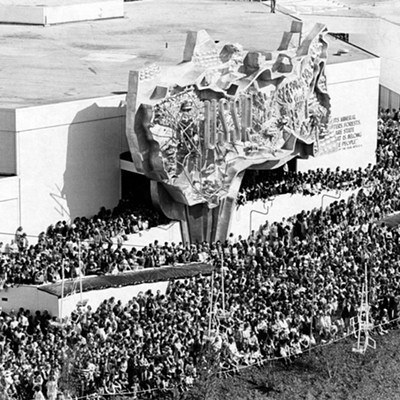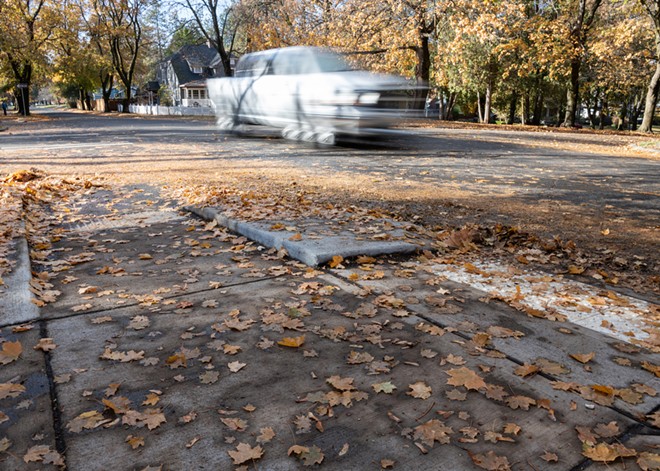
On Monday, Spokane City Council unanimously approved outgoing Mayor Nadine Woodward's $1.2 billion budget for 2024 — including a controversial section that diverts money generated by automatic traffic cameras to the police department.
The money raised by Spokane's red light and speeding camera tickets traditionally goes to a dedicated pot of money called the Traffic Calming Fund, which uses neighborhood input to build physical infrastructure — like speed bumps and stop signs — to slows drivers down.
Woodward's initial proposal to raid the fund was met with a lot of pushback. The Neighborhood Traffic Calming Program is incredibly popular with neighborhoods, and neighborhood council groups often express frustration about the traffic calming projects they request being delayed or not approved at all.
Council members had said they'd be willing to consider using the traffic calming money to stand up a police traffic unit, but they worried the mayor's proposal was too vague and gave police leeway to use the money for purposes other than traffic enforcement. They also worried that raiding the fund would make it difficult to deliver the infrastructure projects neighborhoods had been promised.
"We've been saying in all these meetings that traffic calming is a high priority," Council member Zack Zappone said earlier this month. "If this is almost as high a priority as public safety, why are we going to the chopping block first for that and not other things?"
But on Monday, Zappone and other council members who fretted about the initial proposal relented and approved the mayor's request — with a few changes and guardrails to make sure police don't use the traffic camera revenue as a slush fund.
The fund is projected to bring in about $5.5 million in revenue next year. Woodward initially proposed pulling $2.8 million from the fund and using half of it to stand up a dedicated police traffic enforcement unit. The other half would backfill costs associated with event coverage and other police expenses.
Council members lowered the total amount from $2.8 million to $1.8 million. Of that, $1.4 million will be used to fund a four-person traffic unit, and the rest will cover other traffic enforcement expenses.
Council members also added a last-minute resolution to Monday's agenda that requires police to promise the money will only be used for traffic enforcement. Council members will hold on to the $1.8 million, and reimburse the department when it invoices for expenses related to traffic enforcement.
"I don't necessarily love this," said Council member Michael Cathcart, who has been especially hesitant to draw from the fund. "But the intent is traffic calming... and to stand up an actual traffic unit, which we have not had for a while."
Cathcart added that the fund has enough money to make the proposal work without impacting any of the projects currently planned, and that the agreement would hopefully be phased out within three years.
"We just didn't have a lot of options, but this seemed to make sense," Cathcart said. "We've got, I think, an agreement in place that will hopefully hold folks accountable to how this is intended to be used."
Council member Jonathan Bingle described traffic police as the "most prudent traffic calming measure that we can be taking," and said the planned installation of more cameras next year will increase the fund's revenue.
Zappone argued that police can't be everywhere, and that built infrastructure is ultimately a more effective way of making the roads safer. But he said he was ultimately OK with the agreement because it creates "assurances" that police will actually be doing traffic enforcement.
As she prepared to cast one of her final votes on Monday, departing Council President Lori Kinnear warned her colleagues to keep an eye on the police and hold them to the agreement. Kinnear and other council members have previously expressed frustration about the police department not providing follow-up data after council approves funding requests.
"I won't be here, y'all need to keep them accountable," Kinnear said. "Say, 'Show us the data,' because that's something you need to know."
In addition to the traffic calming money, the 2024 budget approved by council members on Monday increased overall police funding from $81.1 million to $96 million.
Council members said recent budget meetings with the Woodward administration had been productive, but still expressed trepidation about looming financial problems the budget fails to address.
"It's easy to say, 'This budget balances,'" Cathcart said. "Technically, legally, it does. But it's not truly sustainable because when you look at next year, it's no longer balanced."





